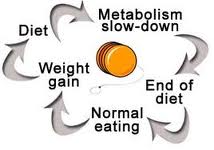My Story
I, myself, started dieting in the sixth grade, and was up and down my whole life. More up than down, as a matter of fact.
I could not correlate it to anything in particular, but sometimes I could lose weight, but inevitably I got to a point that I could not control it – I gained it back.
I remember my mother saying “Willpower!” I felt so good when I had it and did not eat any sugar, but felt so bad when I lost it and indulged.
When I got to medical school, the myth of willpower for weight loss was dispelled when I learned about metabolism, especially the fat-burning metabolism of ketosis. Then I got stuck on the idea that a ketogenic diet – constantly being careful what you ate so that you did not go out of ketosis – was the superior way of weight loss.
Diet-free Weight Loss?
A few years ago, I was introduced to Jon Gabriel and The Gabriel Method, “the revolutionary DIET-FREE way to totally transform your body.” I was impressed with his understanding of biochemistry and metabolism, as well as the mental-emotional-spiritual influences on body weight.
What a comprehensive outlook!
I am excited by his passion in helping people to transform, the way he did when he lost over 220 pounds without dieting or surgery and he gave up dieting forever.
Jon Gabriel talks about his realization that he could not lose weight because no matter what he did, his body wanted to be fat. He was trying to force himself to lose weight against his body’s will!
That lead him to research the real reason we become overweight. He also started to listen to his body and understand his personal circumstances which are not the same for everybody.
The real reason we become overweight Jon calls Fat Triggers.
Fat Triggers are a set of 9 emotional, environmental and lifestyle influences that program your body to cultivate and retain excess weight.
As long as you have the Fat Triggers switched on your body will be programmed to retain excess weight – no matter how much you diet or exercise. Survey these 9 fat triggers and identify the ones affecting you.
Better yet, go to The Gabriel Method Fat Trigger Quiz and answer the questions. Your results will be emailed to you along with more information!
#1 Chronic Dieting
Dieting is the act of forcing yourself to eat less, forcing yourself not to eat certain foods that you crave, or both.
When dieting, biochemical and hormonal changes occur in your body which puts you in the fat conservation mode. You see, a deficit of calories signals famine, so the body responds by becoming efficient at storing fat and will not burn fat for fuel.
In starvation mode, your appetite increases and it takes a lot more food before you feel full. Your taste buds become desensitized so sweet and fatty foods are the only things that are somewhat satisfying. Your brain sends a message to your thyroid to slow down the metabolism. As a result you are hungry all the time and are fighting food cravings.
When you finally give in to the cravings, you gain weight back quickly because with the slowed metabolism, you now have a relative excess of calories which turn to fat.
Also, in starvation mode, the body makes more of the hormone ghrelin, which signals you to overeat when the diet is over.
Studies at the University of California show that up to 95% of the people who lose weight through dieting end up heavier soon after the diet ends.
#2 Lifestyle Stress
Stress, no matter if it is from
- physical
- emotional
- mental
- subconscious
origin, causes the release of cortisol in your body.
The hormone cortisol has positive effects such as a burst of increased immunity and lower sensitivity to pain. It also has the detrimental effect of causing you to gain weight and stops you from losing weight.
#3 Emotional Trauma
Self-defeating emotions like
- powerlessness
- insecurity and
- not being able to say no to people
result in stress, which again releases cortisol. As you already saw, excess cortisol causes you to gain weight and stops you from losing weight.
#4 Inadequate Nutrition
Daily, how much
- protein
- omega-3 fatty acids
- live foods
are you eating? These are most commonly low or lacking in the modern diet.
Inadequate nutrition, not just restricted eating, signals your body that there is a famine. Your body will compensate by telling you to keep eating until you get the nutrients you need.
#5 Poor Digestion
The digestive tract needs certain minerals and nutrients to function well, so you can break down and absorb the food you eat. Poor nutrition leads to impaired functioning of the digestive tract, which in turn impairs the digestion and absorption of the food that is eaten.
This results in nutritional famine, putting your body in fat storage mode. The result is increased hunger and loss of the ability to lose weight.
#6 Toxicity
All-pervasive
- environmental toxins
- pesticides in non-organic produce and grains
- food additives and preservatives
- prescription medications
- alcohol
- cigarettes
are a toxic burden for your body. When the body cannot eliminate them, they are stored in fat cells and your body retains the fat cells to protect you.
#7 Limiting Beliefs
It is easy to believe that being fat is in your genes if you have other family members who are fat.
This is a limiting belief because it is the activation of a fat storing metabolism which causes us to be fat, even if all family members may have a predisposition for it. Trying and failing at diets can leave you feeling like you are incapable of losing weight.
#8 Certain Medications
Over 50 common medications have been shown in studies to cause those who take them to gain weight.
Examples include
- anti-depressants
- insulin
- cortisol
- steroid hormones
- hormone replacement therapy
- birth control pills
For some medications, the weight gain can be up to 10 pounds a month.
#9 Sleep Apnea
Sleep apnea is a disorder in which you stop breathing while you sleep, up to hundreds of times a night, without realizing it. This results in a reduction of oxygen to the brain and all body tissues, leaving you chronically exhausted and leads to unhealthy food cravings.
Poor sleep also influences the hormones leptin and ghrelin in your body. These hormones control feelings of hunger and fullness. When you don’t sleep well, the low levels of lepin reduce the feeling of satisfaction after eating.
The Basics
Identifying your fat triggers gives you some place to start. Be aware of how they are affecting you, and get help to turn them off!
Use mind-body techniques to balance your mental, emotional and spiritual aspects. You can even hold an image of how you desire to look in your mind, or represented as a real photo.
Fortify your diet with protein, omega-3 essential fatty acids, and live foods. Find resources for recipes for inspiration.
Enjoy yourself and don’t overdo it!
Don’t overexercise, don’t starve yourself, and love yourself more and more!








